Palestinians trapped inside Gaza's biggest hospital were digging a mass grave on Tuesday to bury patients who died under Israeli encirclement, and said no plan was in place to evacuate babies despite Israel announcing an offer to send portable incubators.
Israeli forces have surrounded Al Shifa hospital in Gaza City, which they say sits atop an underground headquarters of Hamas.
Hamas, Gaza's ruling group, denies fighters are present and says 650 patients and 5,000-7,000 other displaced civilians are trapped inside the hospital grounds, under constant fire from snipers and drones. It says 40 patients have died in recent days, including three premature babies whose incubators were knocked out. Five weeks after Israel swore to destroy Hamas in retaliation for a cross-border assault by Hamas, the fate of the encircled hospital has become a focus of international alarm, including from Israel's closest ally, the United States.
Ashraf Al-Qidra, Gaza's health ministry spokesman, reached by telephone inside the hospital compound, said there were about 100 bodies decomposing inside and no way to get them out.
"We are planning to bury them today in a mass grave inside the Al Shifa medical complex. It is going to be very dangerous as we don't have any cover or protection from the ICRC, but we have no other options the corpses of the martyrs began to decompose," he told Reuters.
"The men are digging right now as we speak."
Thirty-six babies are left from the neo-natal ward after three died. Without fuel for generators to power incubators, the babies were being kept warm as best as possible, lined up eight to a bed.
Israel announced on Tuesday that it was offering portable, battery-powered incubators so the babies could be moved. But Qidra said that so far no arrangements had been established to carry out any such evacuation.
"We have no objection to have the babies being moved to any hospital, in Egypt, the West Bank or even to the occupation (Israeli) hospitals. What we care most about is the wellbeing and the lives of those babies," he said.
"The occupation is still besieging the hospital and they are firing into the yards from time to time. We still can't move around, but sometimes doctors are taking the risk when they need to attend to patients."
Israel denies the hospital is under siege and says its forces allow routes for those inside to exit. Medics and officials inside the hospital say this is not true and those trying to leave have come under fire.
Medical officials in Hamas-run Gaza say more than 11,000 people are confirmed dead from Israeli strikes, around 40 percent of them children, and countless others trapped under rubble. Around two thirds of Gaza's 2.3 million people have been made homeless, unable to escape the territory where food, fuel, fresh water and medical supplies are running out.
Dr Ahmed El Mokhallalati, a surgeon inside Al Shifa hospital, told Reuters by phone that the main risk now was from dead bodies decomposing.
"We are sure that all kind of infections will be transmitted from that one. Today we had a little bit of rain ... It was really horrible, nobody could even open a window, or just walk around the corridors with a really bad smell," he said.
"Burying 120 bodies needs a lot of equipment, it can't be by hand efforts and by single person efforts. It will take hours and hours to be able to bury all these bodies."
He said that on Monday doctors had performed surgery without any oxygen, which made general anaesthesia impossible.
Israeli forces launched a ground offensive into Gaza at the end of October and have since closed their circle around Al Shifa. In recent days the encirclement of the hospital has appeared to unsettle even Israel's closest allies. "My hope and expectation is that there will be less intrusive action relative to hospitals and we remain in contact with the Israelis," US President Joe Biden said on Monday.
"Also there is an effort to get this pause to deal with the release of prisoners and that's being negotiated, as well, with the Qataris ... being engaged," he added. "So I remain somewhat hopeful, but hospitals must be protected." On Monday, Israel's military released video and photos of what it said were weapons Hamas had stored in the basement of another hospital, Rantissi, specialising in cancer treatment for children. Hamas said the images were staged. The armed wing of Hamas said it was ready to free up to 70 women and children held in Gaza in exchange for a five-day ceasefire. Al-Qassam Brigade spokesman Abu Ubaida said Israel had asked for 100 to be freed.
There was no immediate public response from Prime Minister Benjamin Netanyahu's office, which has generally avoided commenting on negotiations over the release of captives, possibly in a swap for security prisoners held by Israel.
Relatives of some of the hostages set off from Tel Aviv on a days-long protest march to Jerusalem to plead for greater government action to free them.
Yuval Haran, from Kibbutz Be'eri where Hamas fighters killed civilians including his father, said he was marching out of desperation to win freedom for seven family members.
"The hostages in Gaza don't have time. Nor do we have time. For 39 days we have been in infinite anxiety. We are living this pain each and every moment. And I cannot keep sitting down and waiting," he said. "They must be brought home now."
Region
Palestinians dig mass grave inside Israeli-encircled Gaza hospital, no plan to rescue babies
Families of hostages march to press Israeli government to secure release
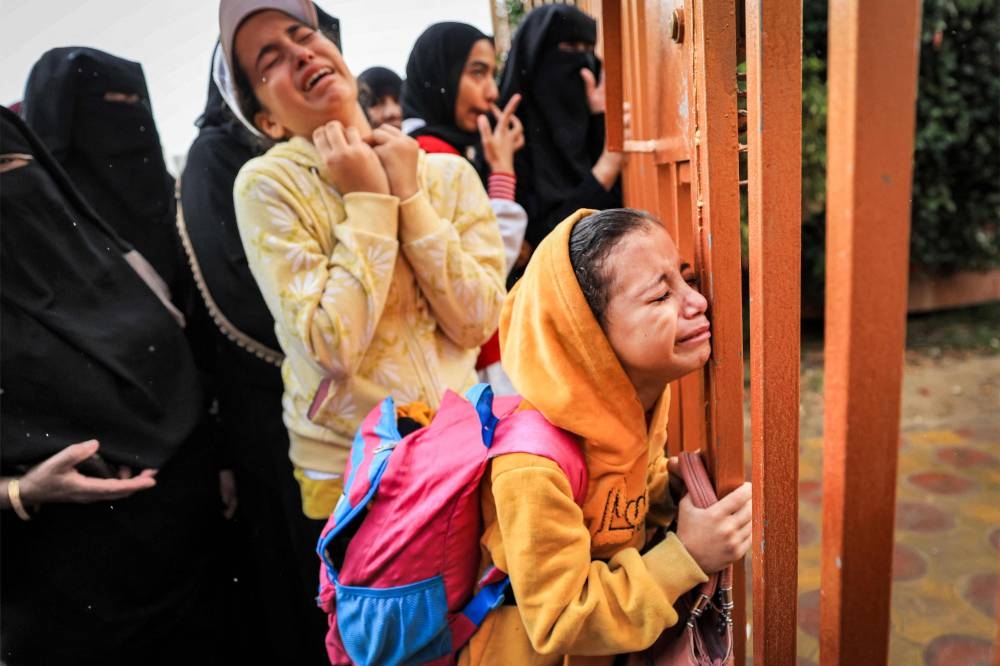
People mourn as they stand behind a metal fence near the bodies of victims who were killed in Israeli bombardment before their burial, at Nasser hospital in Khan Yunis in the southern Gaza Strip, on Tuesday. AFP
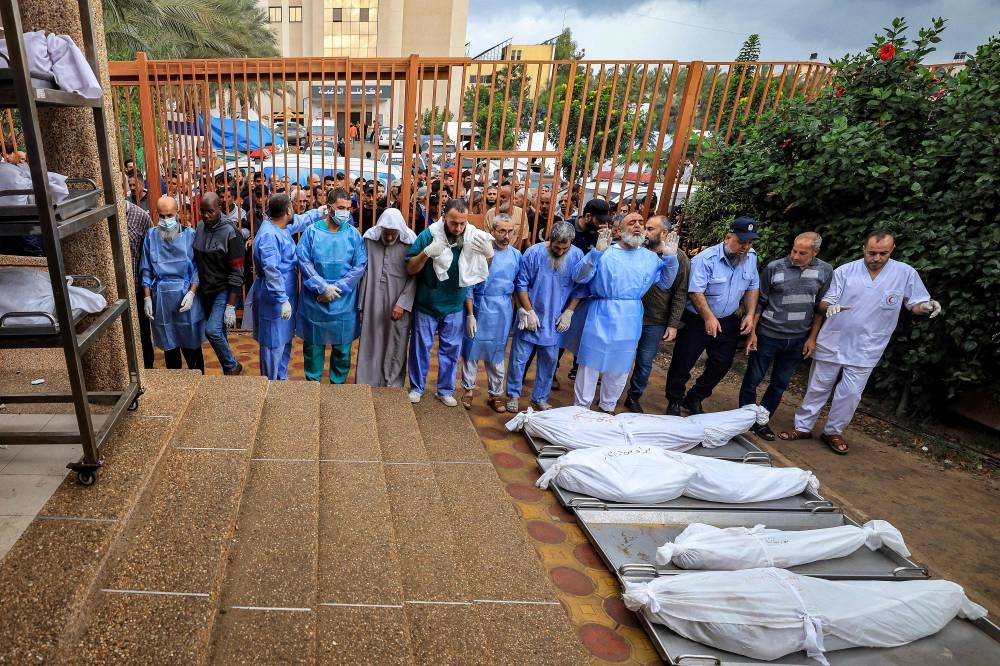
A policeman, physicians, and other men prepare to pray before some of the bodies of victims who were killed in Israeli bombardment before their burial, outside the morgue at Nasser hospital in Khan Yunis in the southern Gaza Strip, on Tuesday. AFP
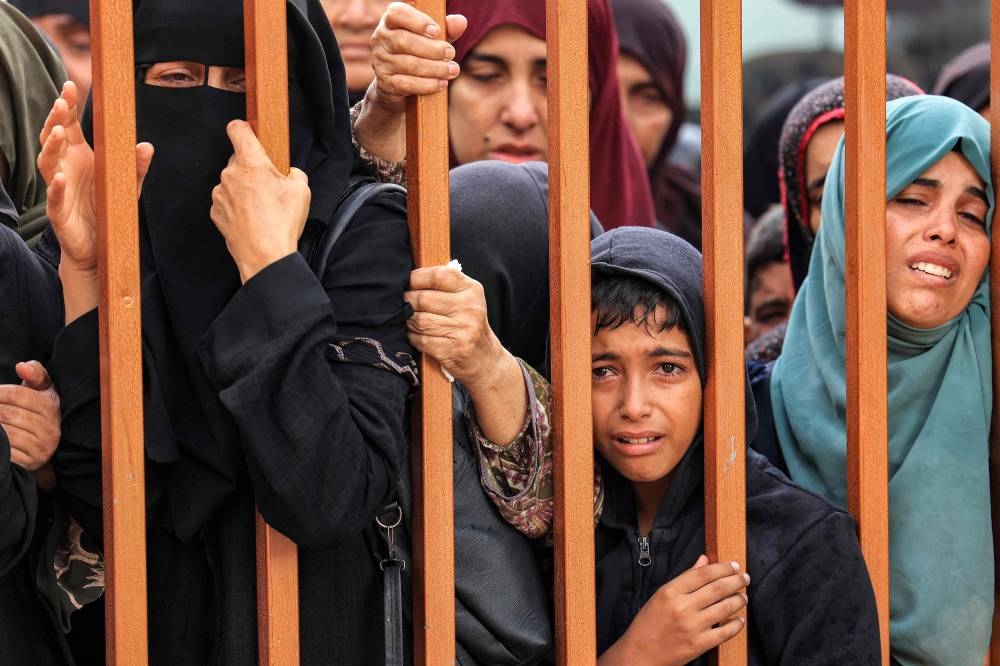
People mourn as they stand behind a metal fence near the bodies of victims who were killed in Israeli bombardment before their burial, outside the morgue at Nasser hospital in Khan Yunis in the southern Gaza Strip, on Tuesday. AFP
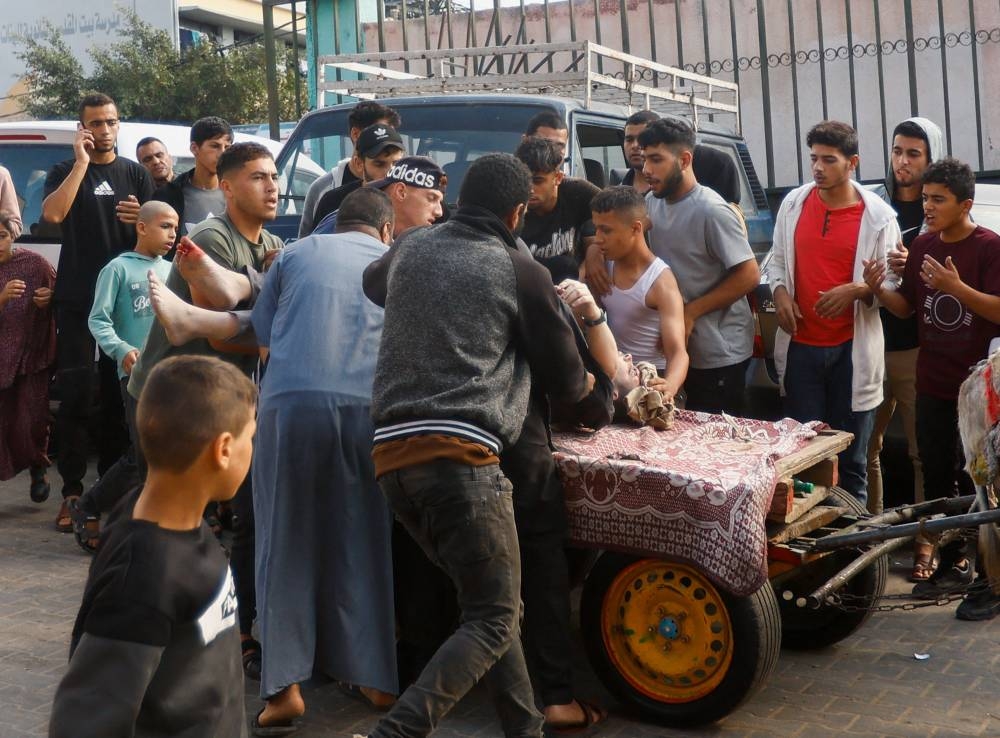
A Palestinian man wounded in an Israeli strike is rushed into Nasser hospital in Khan Younis in the southern Gaza Strip, on Tuesday. REUTERS
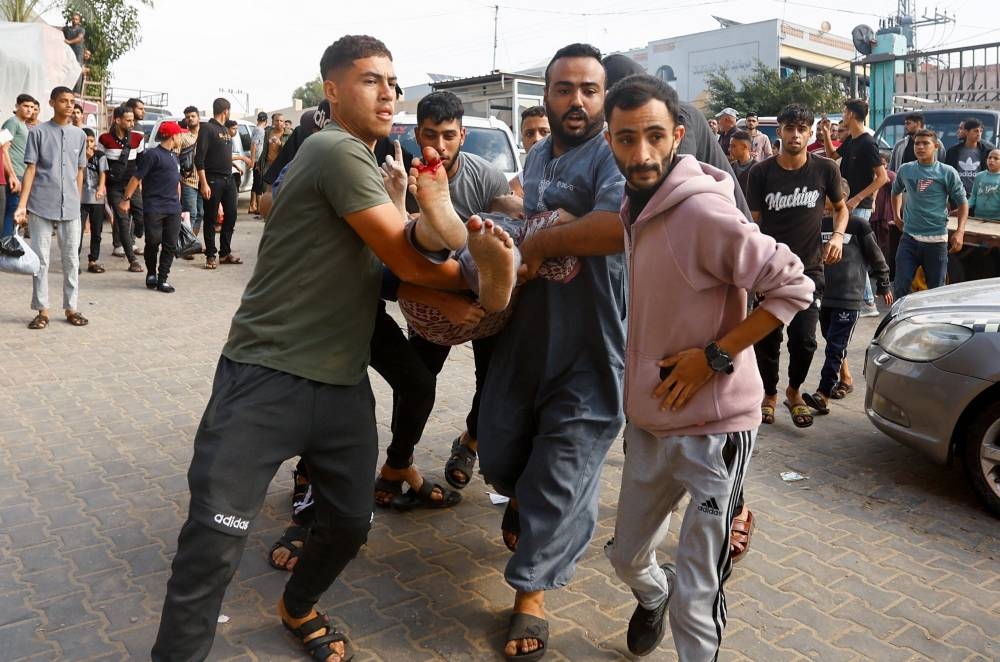
A Palestinian man wounded in an Israeli strike is rushed into Nasser hospital in Khan Younis in the southern Gaza Strip, on Tuesday. REUTERS
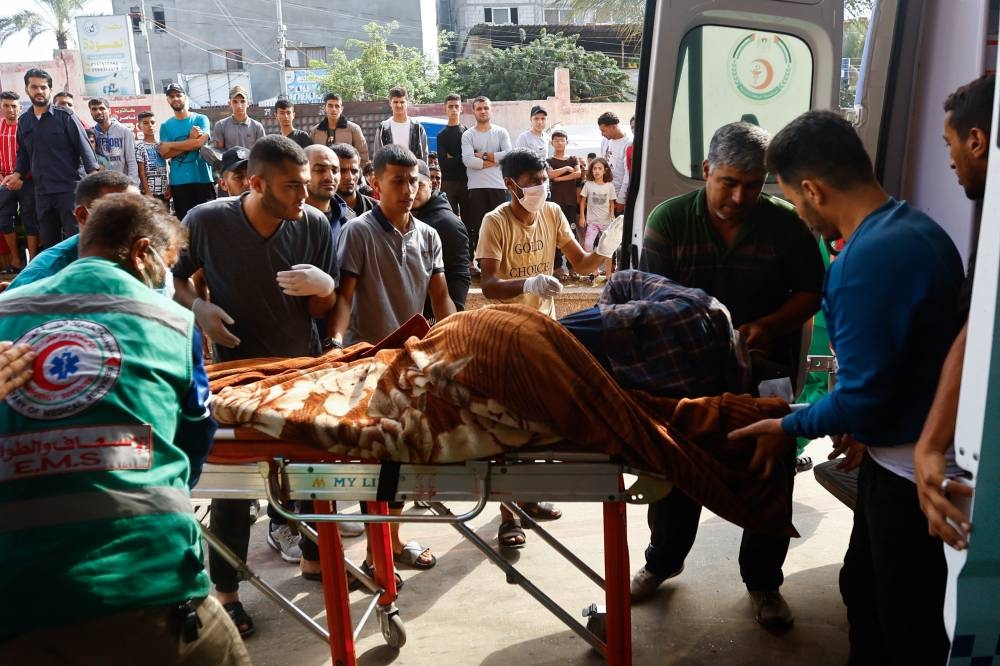
A Palestinian man wounded in an Israeli strike is rushed into an ambulance in Khan Younis in the southern Gaza Strip, on Tuesday. REUTERS
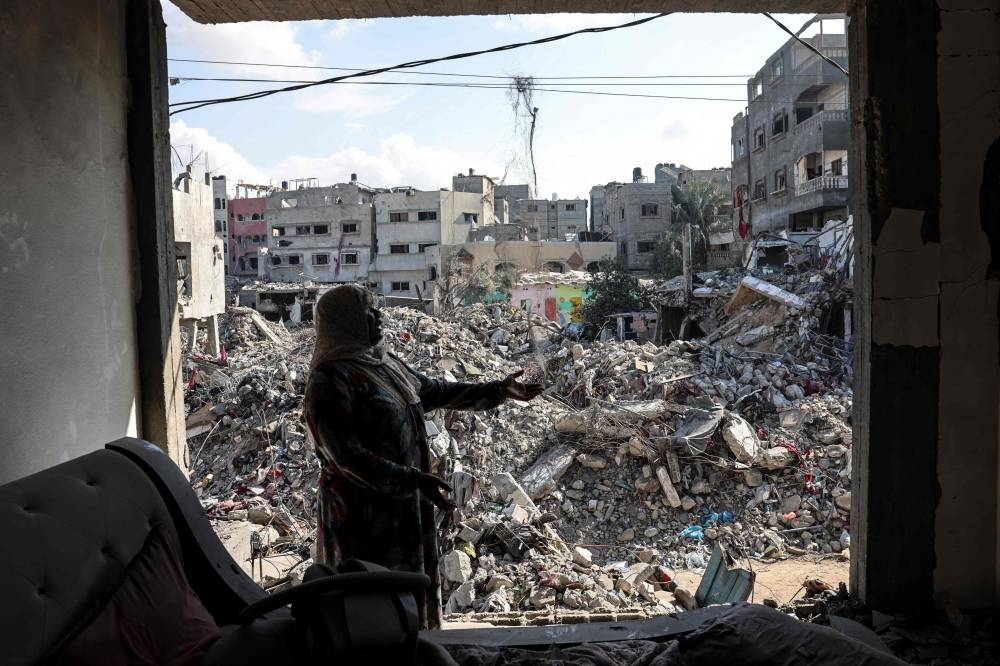
A Palestinian woman gestures as she explains how her home was destroyed duing the Israeli bombardment, in Bureij in the central of Gaza Strip, on Tuesday. AFP
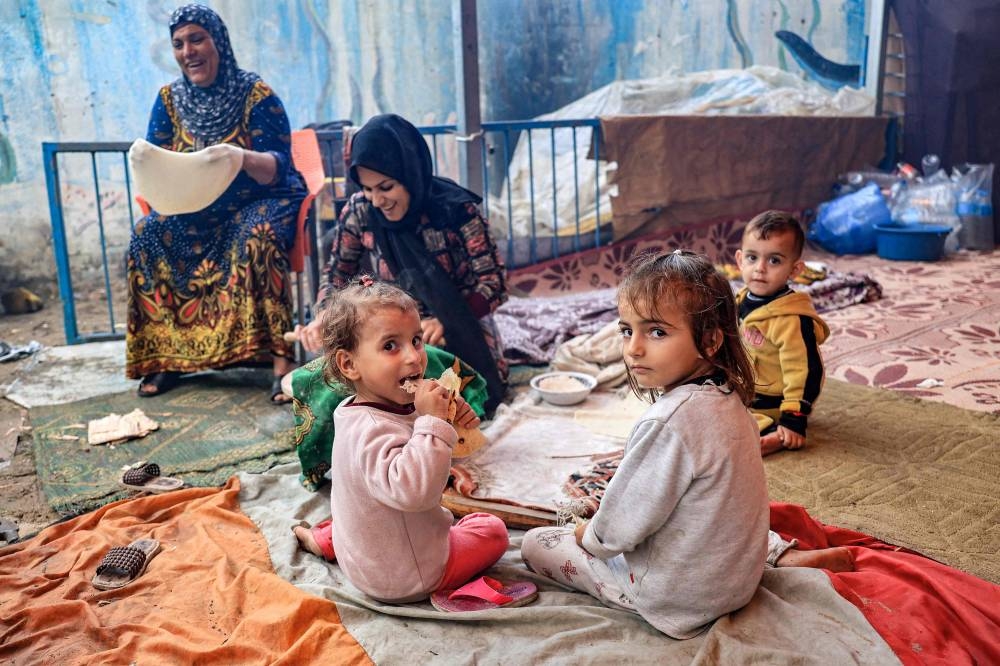
Children sit by a woman preparing traditional unleavened bread on an open fire at school run by the United Nations Relief and Works Agency for Palestine Refugees in the Near East (UNRWA) in Rafah in the southern Gaza Strip, on Tuesday. AFP
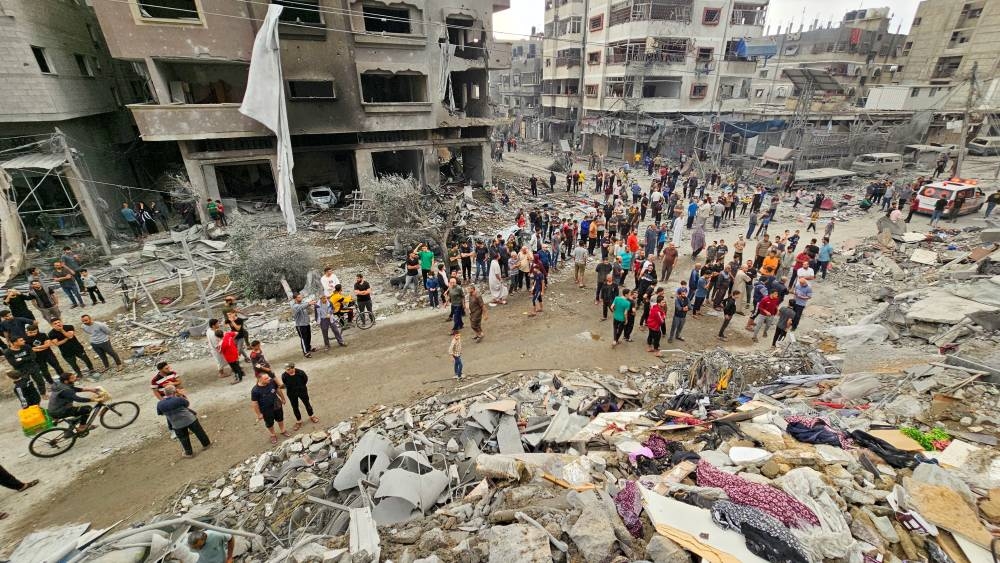
Palestinians inspect the site of Israeli strikes on houses in Jabalia refugee camp, in northern Gaza, on Tuesday. REUTERS
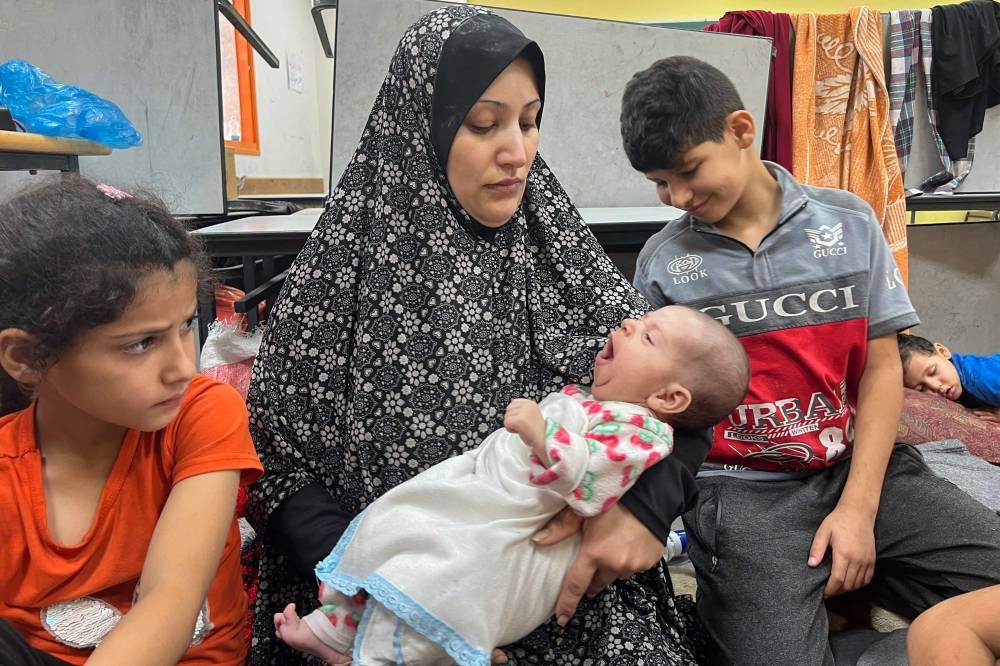
Fadwa Kullab carries her newborn Mohammad at a United Nations Relief and Works Agency for Palestine Refugees in the Near East (UNRWA) in Rafah in the southern Gaza Strip, on Tuesday. AFP
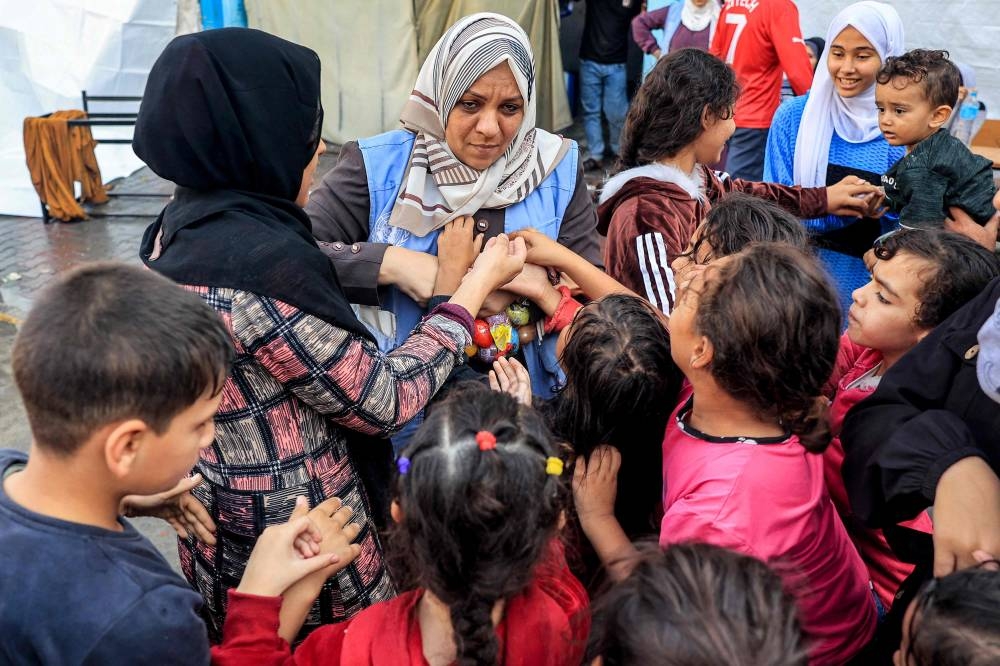
Workers of the United Nations Relief and Works Agency for Palestine Refugees in the Near East (UNRWA) distribute sweets to children at an UNRWA school in Rafah in the southern Gaza Strip on Tuesday, where internally displaced Palestinians have taken refuge amid ongoing battles between Israel and the Palestinian militant group Hamas. AFP
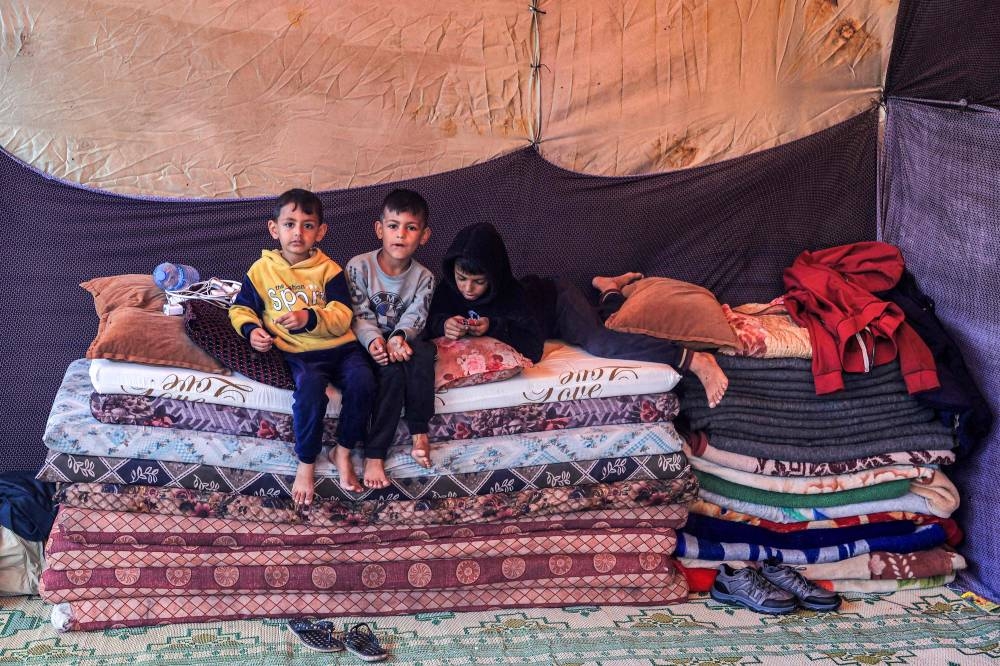
Children sit on mattresses in a shelter at a school run by the United Nations Relief and Works Agency for Palestine Refugees in the Near East (UNRWA) in Rafah in the southern Gaza Strip, on Tuesday. AFP
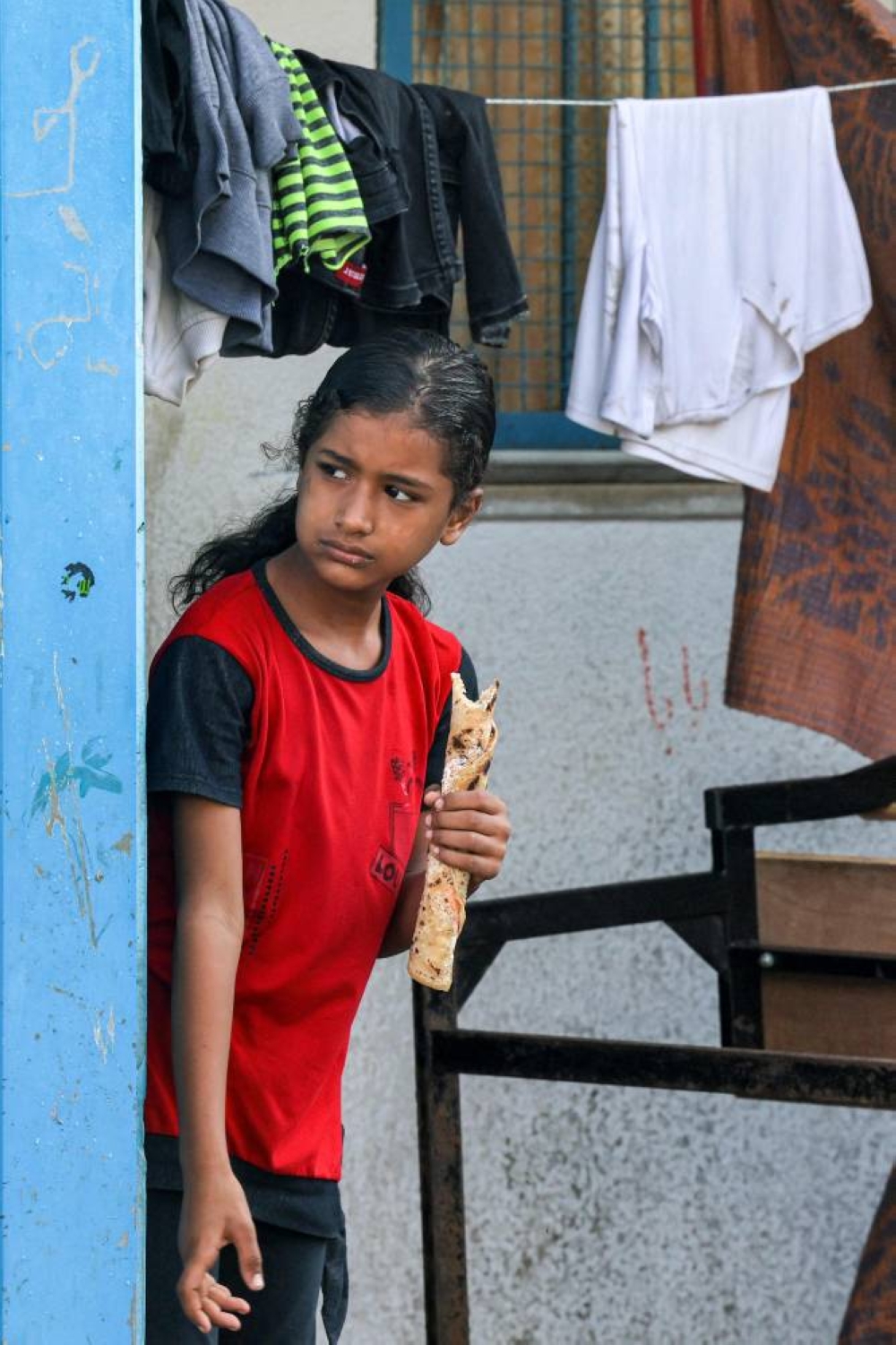
A girl holds a sandwich wrap as she stands behind laundry drying on a line at a school run by the United Nations Relief and Works Agency for Palestine Refugees in the Near East (UNRWA) in Rafah in the southern Gaza, on Tuesday. AFP
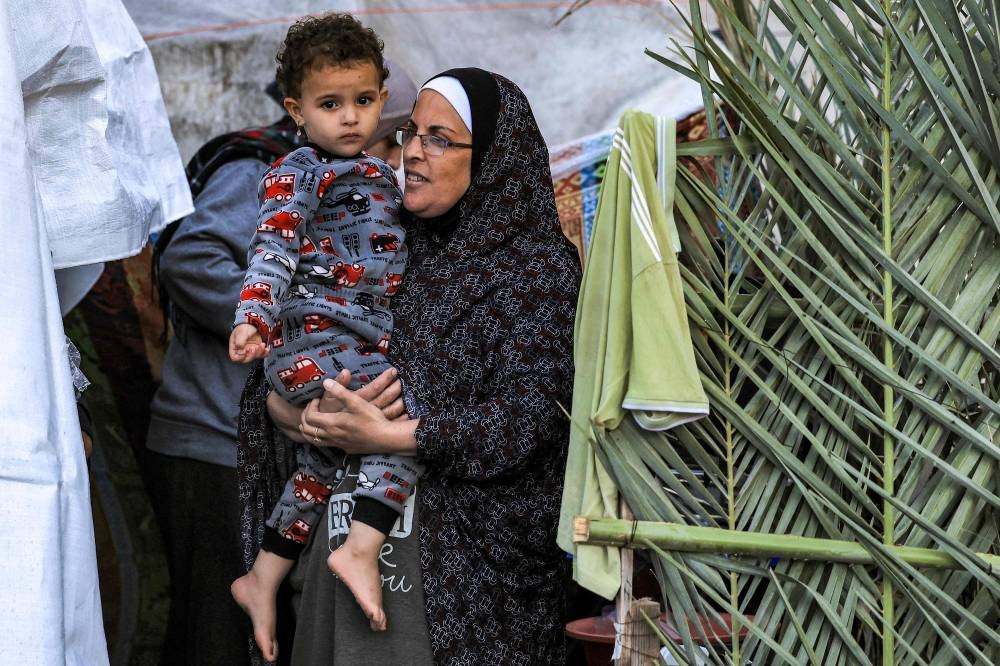
A woman carries a child while walking outside one of the tents pitched by Palestinians taking shelter from Israeli bombardment around Nasser Hospital, in Khan Yunis in the southern Gaza Strip, on Tuesday. AFP
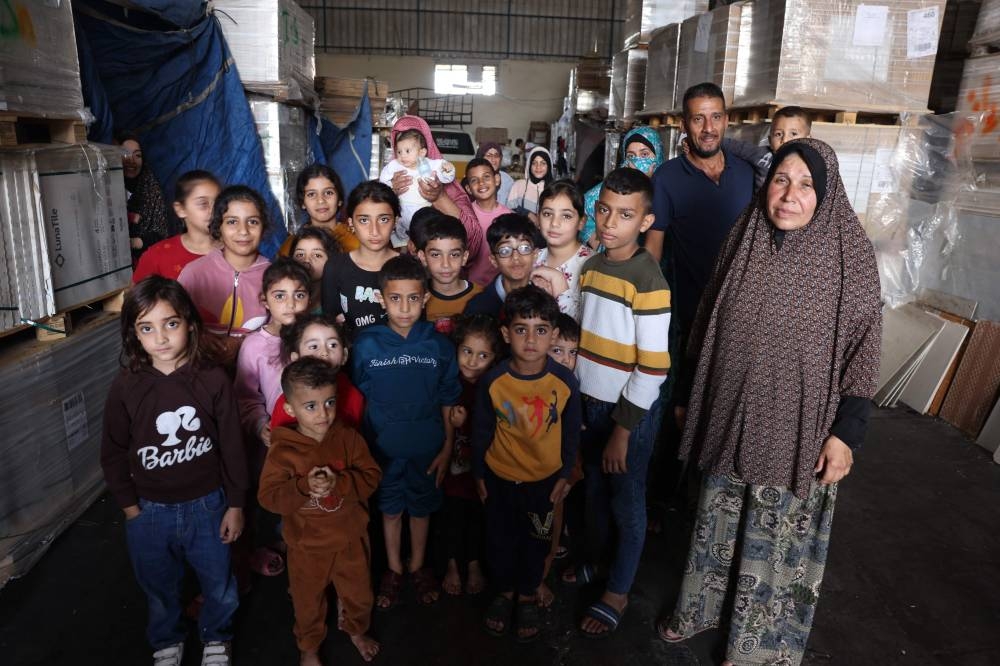
Children and their families pose for a photograph inside a large ceramic's shop where they are currently living in Bureij, in the central of Gaza Strip, on Tuesday. AFP
